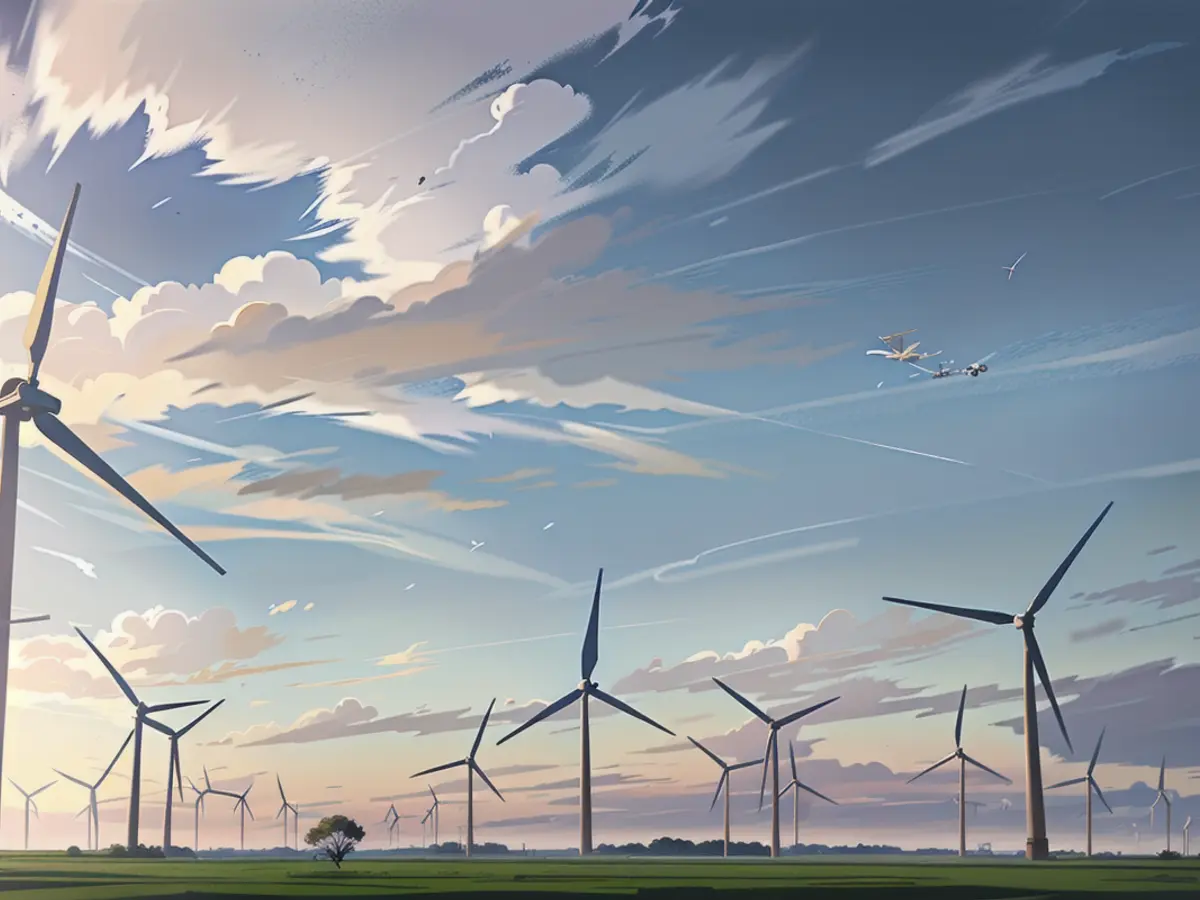Green sources of energy - Rising "wind Euro" may lead to greater benefits for municipalities.
The proposed hike in the "Wind-Euro" could mean reduced funds for municipalities in terms of wind energy projects, warns the wind industry. They are concerned about the possibility of the levy being almost doubled or tripled from 2026, resulting in a double burden for operators as they already receive payments for voluntary services under the Renewable Energy Act (EEG). "This is an unaffordable move that may hinder the growth of wind energy initiatives in Brandenburg," said Janko Geßner, board member of the Berlin-Brandenburg Renewable Energy Association, during a Potsdam Economic Committee meeting. "If this occurs, municipalities might end up worse off."
Brandenburg's plan to increase the "Wind-Euro" for new or refurbished installations from 2026 entails a special tax for wind energy plant operators on adjoining municipalities. This move is aimed at increasing public acceptance, as wind turbines increasingly face criticism, often in their immediate vicinity.
The municipalities will no longer receive a flat rate of 10,000 euros yearly per wind energy plant, but the levy will depend on the plant's output. If a modern wind energy plant generates 5,000 euros per megawatt of installed capacity, it could potentially contribute around 30,000 euros annually to its neighboring communities, estimates the Ministry. The cabinet has greenlit the "Wind-Euro," but the state legislature is yet to make the final call.
The mayor of Mühlenfließ (Potsdam-Mittelmark), Jens Hinze, foresees financial loss. The operators could halt the voluntary EEG payments if the Wind-Euro is implemented, according to Hinze, who addressed the committee. "For the region surrounding Mühlenfließ, this would imply 150,000 euros less in annual funding." The wind industry proposes aligning federal and state regulations, reducing the special levy to 2,500 euros per megawatt of installed capacity and encouraging greater citizen involvement in wind energy projects.
Since 2019, Brandenburg municipalities have been affected by a levy on the operation of wind turbines within their confines. These funds are earmarked for acceptance-enhancing measures related to wind energy. As per the Ministry of Economics, municipalities are entitled to 1.87 million euros for this purpose. In addition, the municipalities received over 22.7 million euros in 2022 from voluntary payments under the EEG.
The municipalities that have garnered the highest "Wind-Euro" payments are Mühlenfließ (111,490 euros in the previous year), Karstädt (Prignitz) (87,196 euros), and Jacobsdorf (Oder-Spree) (72,013 euros).
Brandenburg is the second-ranking German state in wind energy, with a capacity of 8,662 megawatts, as per the German Wind Energy Association for 2023. Municipalities in Brandenburg will also be involved in solar plant operations starting in 2025, under a "Solar-Euro." Brandenburg emphasizes the expansion of eco-energy.
Additional Images (Not Included in Original Text)
- Wind Turbine
- Map of Brandenburg
Additional Links
German Wind Energy Association
Additional Highlighting
Read also:
- Tough return to normality in snow and ice
- Fewer unauthorized entries: Domino effect through controls
- Trial against BND employee from mid-December
- Xhaka leads Leverkusen to triumph in cup tournament, scoring two goals.
- The increase in the "Wind-Euro" could negatively impact municipalities' financial support for renewable energy projects, particularly in wind energy, as warned by the wind industry.
- The planned increase in the "Wind-Euro" for new or refurbished wind energy installations in Brandenburg from 2026 will impose a special levy on adjacent municipalities, aimed at increasing public acceptance.
- If implemented, the Wind-Euro could lead to a decrease in voluntary EEG payments, resulting in a financial loss for municipalities, as noted by the mayor of Mühlenfließ, Jens Hinze.
- The proposed alignment of federal and state regulations, reducing the special levy and promoting citizen involvement in wind energy projects, is a proposal made by the wind industry to offset potential losses.
- The German state of Brandenburg, second in wind energy capacity with 8,662 megawatts, is also planning to involve municipalities in solar plant operations starting in 2025, under a "Solar-Euro."
Source:








